As viruses and other malware are modern-day digital villains, Linux antivirus software becomes a must-have.
However, since so many virus protection solutions for Linux exist, choosing the best one may be a hassle. Here is where this guide comes to your rescue. We will dive deep into the best free antivirus for Linux and present the best deals according to their categories. You can choose the one that fits your lifestyle best.
In this article
- Quick List: Top Linux Antivirus Software
- ClamAV: Best for Detecting Email Threats
- Sophos: Best for Web Protection
- ChkrootKit: Best For Linux Server Maintenance
- Rootkit Hunter: Best for Backdoor Scans
- Firetools: Best for Sandboxing
- Qubes OS: Best for Overall Protection
- Comodo: Best for Versatile Features
- Top Linux Antivirus Software Specs Comparison
How to Choose the Best Antivirus Software for Linux
Antivirus software should fulfill some of your standards to become your preferred tool. Here are the essential aspects to consider when choosing the ideal solution:
- Features – your ideal antivirus software should have all the essential elements to streamline your experience. Look for solutions with your desired features.
- Graphical user interface – one of the first aspects to consider is the GUI. Find a tool that is easy to navigate and use for the best, most secure experience.
- Support – if you encounter issues with your tool, a fast and responsive support team should be there to fix the problems quickly.
- Data collection – research how much data a particular antivirus tool will collect before committing. If you don't like the terms and conditions, find a better solution.
- Open-source vs. proprietary solutions – when choosing the best antivirus software for Linux, consider whether you want a transparent tool (open-source) or one with more features and better support.
Once you create a plan according to these elements, you can start your search journey.
Best Free Linux Antivirus Software
- ⏰Testing length: Two months per software
- ✍Number of Linux antiviruses tested: 15
Quick List: Top Linux Antivirus Software
🏅Best overall: Qubes OS (4.5/5)
🏅The most versatile antivirus: Comodo (4.3/5)
🏅Best for Linux server maintenance: Chkrootkit (4.2/5)
🏅Best for sandboxing: Firetools (3.9/5)
🏅Best for web protection: Sophos(3.7/5)
ClamAV: Best for Detecting Email Threats

ClamAV is an open-source antivirus solution that is able to detect and eliminate email threats. It's ideal if you use your inbox daily. The program will automatically detect threatening content and remove it from your mailbox.
During our testing period, the results of ClamAV were satisfying overall. Since it's an open-source antivirus, you can't expect many features, but those you get are fantastic. You will get top-notch protection with ClamAV.
Best Features
Some of the best features of ClamAV include:
- Command-line scanners
- Support for various archive formats
- Database updater
Pros & Cons
Supported Linux distributions:
ClamAV supports Alpine 3.11, Ubuntu 18.04 & 20.04, CentOS 7 & 8, Fedora 30 & 31, openSUSE Leap, and Debian 9 & 10 Linux distributions.
Business Plan
ClamAV is a free antivirus software solution, meaning you won't find a business plan on this platform. It's free for everyone, regardless of preferences and workflow.
Final Score
After thorough examination and testing, we can conclude that ClamAV is excellent software. However, is it perfect for all your antivirus needs? No, not really, as it will launch false positives sometimes. Thus, we give this solution a 3.8/5 rating.
Sophos: Best for Web Protection

Sophos is a versatile antivirus tool, able to detect even minor dangers. With this solution, you will feel protected and secure, even from online evil eyes. Although the solution offers numerous features, it's best for web protection and phishing attempts.
Over the past two months, we have noticed that Sophos has some of the most effective scans in the industry, able to discover the undiscoverable. Another honorable mention goes to the GUI, which is clean and easy to navigate.
Best Features
Some of the most exceptional features you can find on Sophos include:
- Scheduled scans
- Web filtering
- Parental web filtering
Pros & Cons
Supported Linux distributions:
Sophos supports numerous Linux distributions, including Amazon Linux, Amazon Linux 2, CentOS, CentOS 8 Support, Debian 9, Debian 10, Oracle Linux 7/8, Oracle Linux 8, Red Hat Enterprise Linux 7/8/9, SUSE Linux Enterprise Server 12, SUSE Linux Enterprise Server 15, Ubuntu 18 LTS, Ubuntu 20.04 LTS (with the release of version 10.6), and Ubuntu 22.04 LTS.
Business Plan
Since you will get limited features with the free plan, you may want to upgrade to the business version for the best experience. If so, you can get custom pricing and choose the antivirus functionalities you need with Sophos.
Final Score
After using this tool for a while, we can say it has all the essentials to protect your Linux device. You could get so much more for free, so we give this software a 3.7/5 rating.
ChkrootKit: Best For Linux Server Maintenance

Chkrootkit is an open-source solution for checking Linux servers. It can detect and close security gaps, making your server run smoothly and danger-free. The concept of this tool differs significantly, as you will see below.
After testing this antivirus software, we can say we're pleasantly surprised. The tool has removed all server malware in just a few clicks. However, some may not like the idea of no graphical user interface.
Best Features
Chkrootkit isn't a tool that offers specific features you can enjoy. Instead, it has scripts and command lines to check for potentially harmful behavior and instances in your servers. Thus, we can't pinpoint the best features, as there aren't any.
Pros & Cons
Supported Linux distributions:
You can use Chkrootkit on these Linux distributions: Linux 2.0.x, 2.2.x, 2.4.x, 2.6.x, 3x, 4x, and 5x. FreeBSD 2.2.x, 3.x, 4.x, 5.x, 7.x and 10.x, OpenBSD 2.x, 3.x, 4.x and 5.x., NetBSD 1.6.x, Solaris 2.5.1, 2.6, 8.0 and 9.0, HP-UX 11, Tru64, and BSDI.
Business Plan
Chkrootkit is another 100% free solution, so you won't have to pay to use more advanced features and protect your Linux device. However, if you wish, you can make donations to thank the founders for their brilliant work.
Final Score
Chkrootkit may have a steeper learning curve, but it's still one of the best Linux antivirus solutions. It'll thoroughly examine your servers and leave no dangerous particles behind. Thus, we give it a 4.2 out of 5.
Rootkit Hunter: Best for Backdoor Scans

Since its release in 2003, Rootkit Hunter has become one of the most prevalent solutions to local exploits and possible dangers for Linux servers. This tool can detect even minor lags and viruses and make them disappear in the bImage name of an eye.
Although an older tool, Rootkit Hunter performs well with modern devices. It can handle most tasks, making it productive and efficient. This solution will find and kill any bugs causing issues on your Linux device.
Best Features
Like Chkrootkit, Rootkit Hunter is a command-line tool that doesn't offer any features. Instead, you will get a script you can run to perform malware scans and detect possible harm. So, this tool has only one functionality, and we can say it's among the best.
Pros & Cons
Supported Linux distributions:
Rootkit Hunter is compatible with the following Linux distributions: AIX 4.1.5 / 4.3.3, ALT Linux, Aurora Linux, CentOS 3.1 / 4.0, Conectiva Linux 6.0, Debian 3.x, FreeBSD 4.3 / 4.4 / 4.7 / 4.8 / 4.9 / 4.10, FreeBSD 5.0 / 5.1 / 5.2 / 5.2.1 / 5.3, Fedora Core 1 / Core 2 / Core 3, Gentoo 1.4, 2004.0, 2004.1, Macintosh OS 10.3.4-10.3.8, Mandrake 8.1 / 8.2 / 9.0-9.2 / 10.0 / 10.1, OpenBSD 3.4 / 3.5, Red Hat Linux 7.0-7.3 / 8 / 9, Red Hat Enterprise Linux 2.1 / 3.0, Slackware 9.0 / 9.1 / 10.0 / 10.1, SME 6.0, Solaris (SunOS), SUSE 7.3 / 8.0-8.2 / 9.0-9.2, Ubuntu, Yellow Dog Linux 3.0 / 3.01.
Business Plan
Like Chkrootkit, Rootkit Hunter is entirely free; you won't need to pay to use some of the features. Thus, you can't find a business plan on this platform.
Final Score
Rootkit Hunter was a masterpiece in 2003. However, no matter how far ahead of its time it was, it's now one of the most outdated rootkit solutions. Nonetheless, it still performs well (not the best), so we give it a 3.5/5 rating.
Firetools: Best for Sandboxing

Firetools is Firejail's GUI. It uses SUID (Set User ID) to minimize security breaches and monitor the applications on your Linux device. Since Firejail doesn't offer a GUI, Firetools makes the journey more manageable. It's an addition to the Firejail Sandbox, which is among the best in the world for Linux systems.
Sandboxing implies isolating an application from other applications to preserve its health and keep it safe from potential threats. If you're searching for such a tool, Firetools is your ideal choice.
We can say that Firetools is an excellent upgrade to the non-GUI environment. You can maximize your workplace productivity and detect possible dangers thanks to this fantastic addition. Firetools and Firejail undeniably make an unstoppable duo.
Best Features
Some of the features you can find on Firetools/Firejail are:
- Security filters
- Statistics and monitoring
- Access control
Pros & Cons
Supported Linux distributions:
Firetools is supported by all Arch, Debian, Gentoo, Mint, Slackware, and Ubuntu variations.
Business Plan
Firetools/Firejail doesn't offer a designated business plan. Instead, you can use the tools and services for free forever.
Final Score
Although Firejail is among the most efficient tools to protect your Linux devices, the road to mastering it may be bumpy. Because of that, we give Firetools/Firejail a 3.9/5.
Qubes OS: Best for Overall Protection

Qubes OS is an independent operating system that provides users with top-notch security. You can combine it with the Linux OS using the dual-boot configuration and creating a virtual machine. Once you do, Qubes OS will isolate all threatening apps, making your device virus- and threat-free.
Although it may seem complicated, Qubes is straightforward to use. We had an excellent experience while testing it and can say that it is the most effective out of the bunch.
Best Features
Some of the best features you can find on Qubes OS are:
- Reliable isolation
- An integrated proxy
- Using multiple operating systems
Pros & Cons
Supported Linux distributions:
The Qubes operating system can be downloaded on Whonix, Ubuntu, Arch Linux, CentOS, Fedora, Debian Linux, or Gentoo variations.
Business Plan
One of Qubes OS's most remarkable features is that it doesn't ask for anything in return. You can use all the security features for free without purchasing a business plan.
Final Score
Although Qubes may be a bit complicated to set up, it's one of the best, most secure tools you can use on Linux. Even if one of your apps becomes infected, the program will automatically isolate it so it doesn't affect other compartments. Thus, we give this solution a 4.5/5 rating.
Comodo: Best for Versatile Features

Comodo is among the most popular antivirus solutions for Linux devices. Whether you need a tool for professional or personal use, this one may be the ideal choice. It's a feature-packed, high-performing antivirus that will have your back at all times.
While testing this tool, we couldn't help but notice how fast and efficient it was. It could seamlessly handle all tasks and threats, so much so that its capacity and capabilities blew us away.
Best Features
Some of Comodo's most prominent features are:
- Real-time behavior analysis
- On-access scanners
- Spam mail blocks
Pros & Cons
Supported Linux distributions:
Comodo supports the following Linux distributions: Ubuntu 12.04, Red Hat Enterprise
, Linux Server 5.9, 6.3, Fedora 17, SUSE Linux Enterprise Server 11, OpenSUSE Linux 12.1, Debian 6.0, CentOS 5.9, 6.2, Mint 13, and CentOS 5.8, 6.2.
Business Plan
This antivirus software might be ideal if you want more out of your antivirus experience and are searching for the best business plans. Comodo offers Enterprise plans you can use for your establishment, and the prices are around $200 annually. Moreover, you can get a custom quote according to your preferences and needs, making this tool highly versatile.
Final Score
After testing and reviewing this tool, we can say that it made it to the list of the best antivirus software for Linux for a reason. We give it a 4.3/5 rating because it's high-performing, reliable, and durable.
Top Linux Antivirus Software Specs Comparison
Here's a thorough comparison of all the tools above to help you choose the best one for your needs.
| Product | Firewall | GUI | Server/ Network Protection | Behavior-based Malware Detection |
| ClamAV | ❌ | ❌ | ❌ | ❌ |
| Sophos | ✅ | ✅ | ✅ | ✅ |
| Chkrootkit | ❌ | ❌ | ❌ | ❌ |
| Rootkit Hunter | ❌ | ❌ | ❌ | ❌ |
| Firetools | ❌ | ✅ | ❌ | ❌ |
| Qubes OS | ✅ | ✅ | ✅ | ❌ |
| Comodo | ✅ | ✅ | ✅ | ✅ |
Bonus: How to Recover Virus-Deleted Files on Linux
Viruses can be some of the most dangerous enemies that come close to your computer. If you've had an experience with these invisible enemies and discovered that you've lost some of your most valuable files, you're probably looking for a way to retrieve them.
We recommend third-party recovery software to retrieve your digital valuables. Tools like Wondershare Recoverit can recover any file type in minutes, making your files as good as new. This software has a 95% success rate, one of the highest in the industry, meaning you will restore your data without a hitch.
The best part about Wondershare Recoverit is that you can use the Advanced Repair feature to enhance data quality and get an even better file back. However, you must act fast and download the software when you notice some missing files. Then, follow the guide below to recover your data:
- Launch Wondershare Recoverit and head to NAS and Linux. Click Linux Recovery.
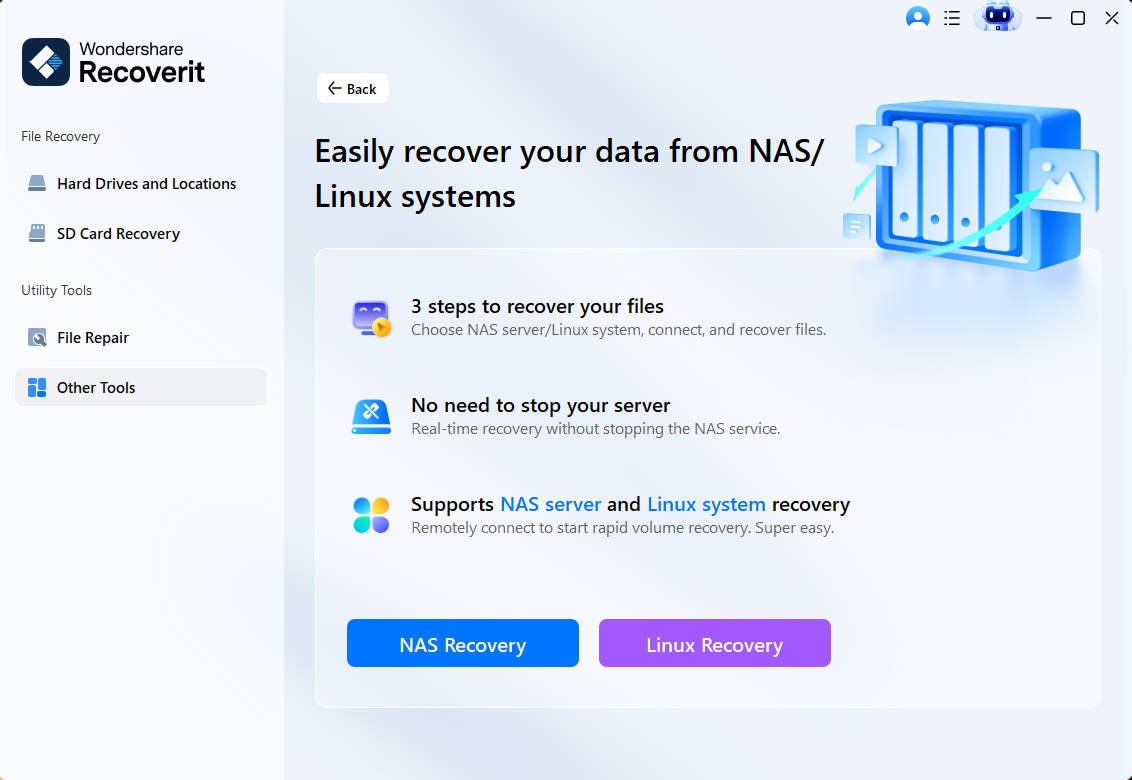
- The software will ask you to connect your PC to a Linux device to continue the operation. Once you do, click Connect.
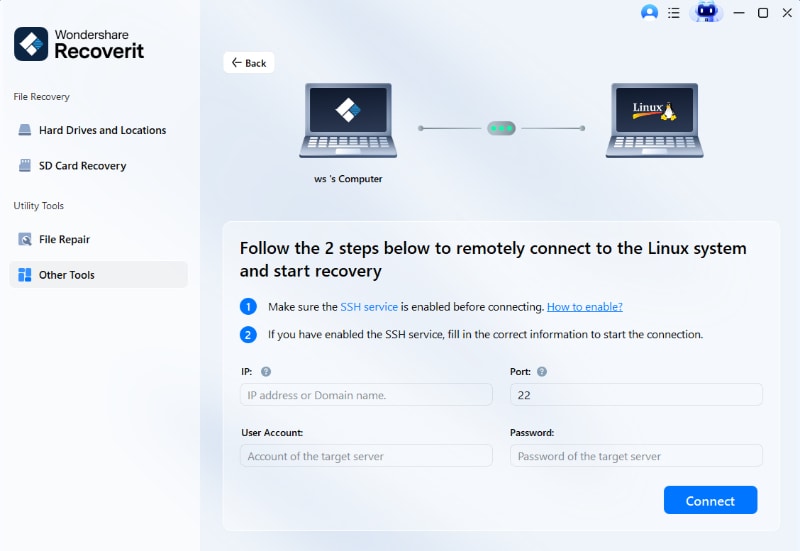
- The program will automatically scan your device and extract data.
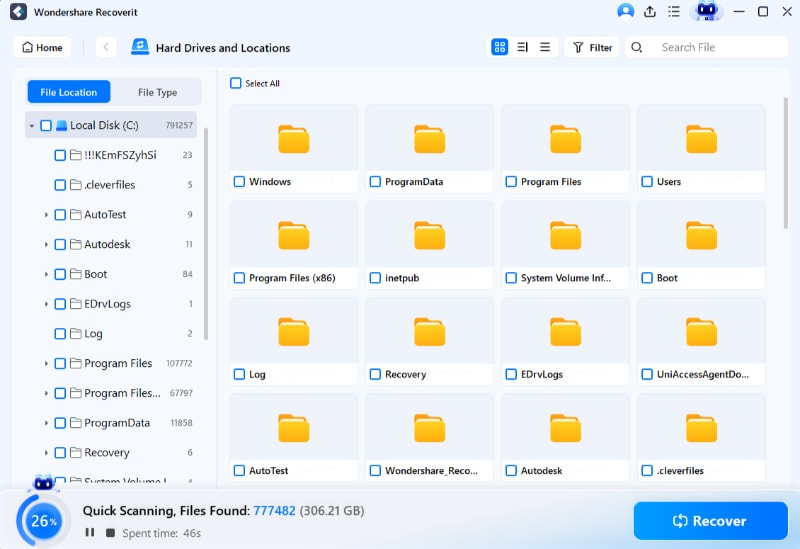
- Once it finishes scanning, preview your files and choose what to retrieve. Click Recover to complete the process.
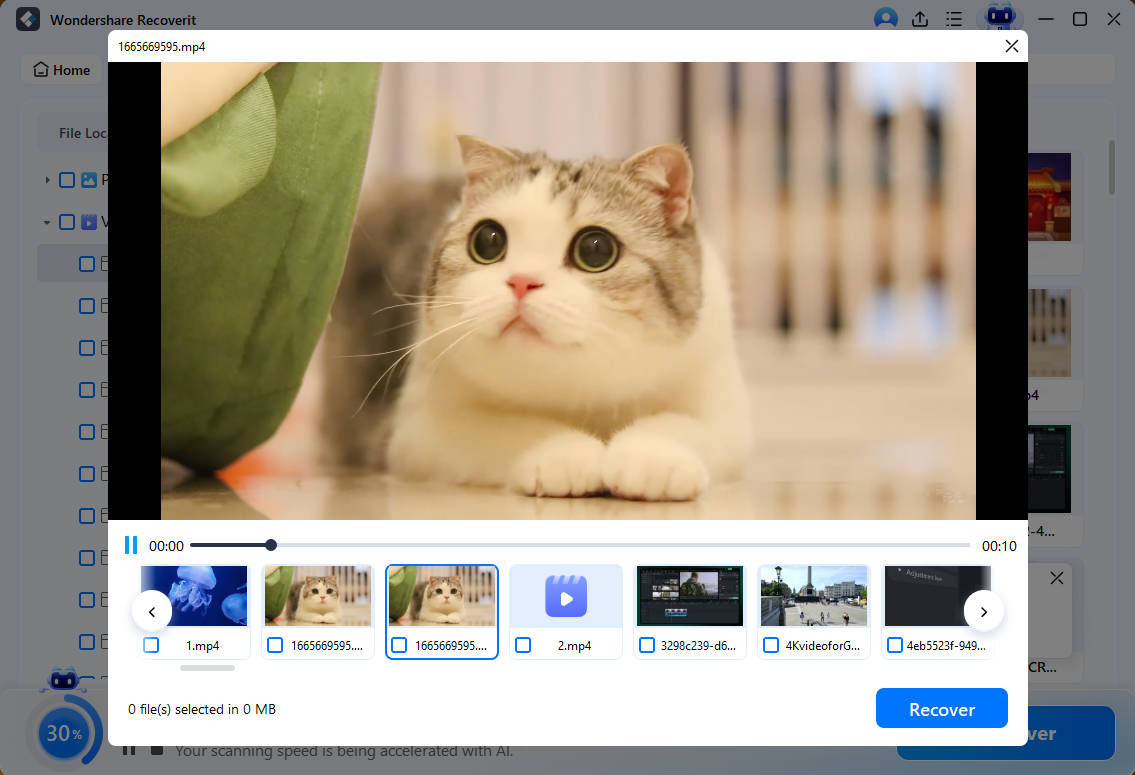
- Select a path to save the files.
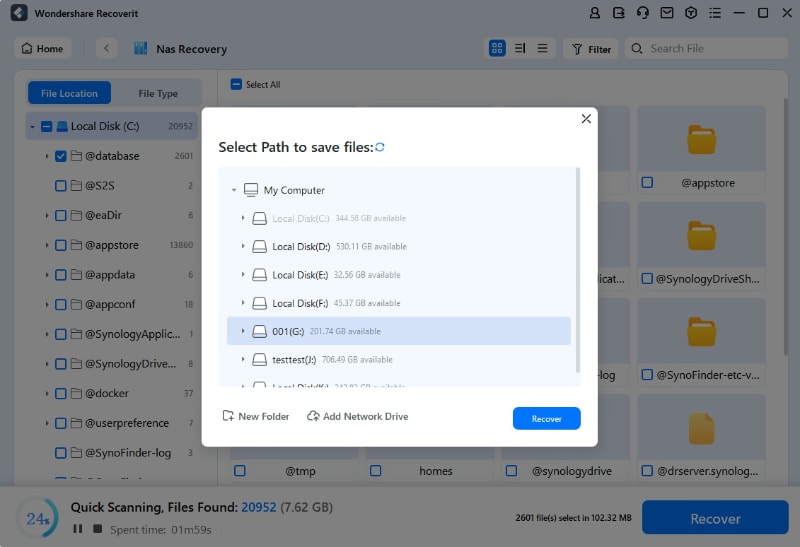
Conclusion
Viruses and other malware may be the worst problems happening to your computer. Once they enter your system, they can create a rampage, wiping everything they encounter. Fortunately, antivirus software can protect your Linux device and valuable data from such chaotic instances.
Since choosing the best anti-malware solution for Linux can be challenging, we have created a list to help you select your favorite. You can also check out the comparison table for more details. Don't forget to have a data backup plan, including a recovery tool like Wondershare Recoverit, in case viruses and other malware attack your device and cause data loss.



 ChatGPT
ChatGPT
 Perplexity
Perplexity
 Google AI Mode
Google AI Mode
 Grok
Grok






















